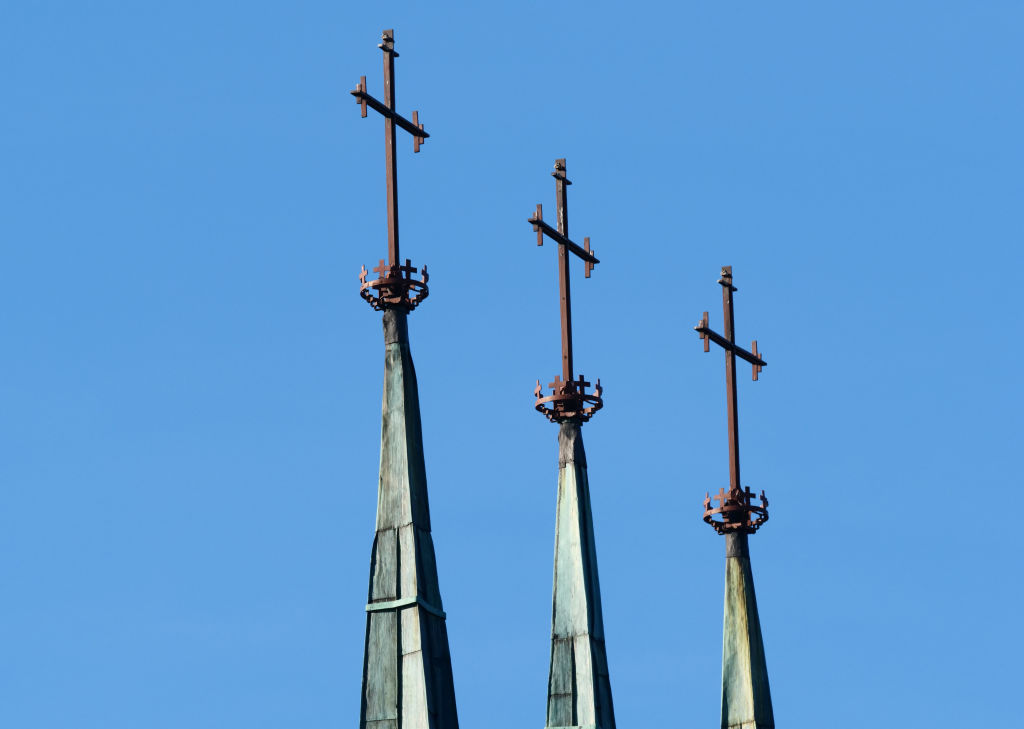Americans have debated religion’s role in the public square since before America was even a country. Today, the hot topic is “Christian nationalism.”
One side argues America is an essentially Christian nation whose history and institutions are unintelligible without reference to Christianity. Thus, the government should actively promote a Christian culture. The other side wants to distance religion from the state. It worries about the corrosive effects of a politicized Christianity, both on the government and the church, and contends that Christianity’s basic conception of human dignity precludes public coercion over religious matters.
But for Christians to rightly assess how the Kingdom of God intersects with the kingdoms of men, we must start with Christianity’s revolutionary political message. It’s not about policies or even institutions writ large. Rather, it’s about understanding the role of the church—the collective body of Christians—which transfigures the very meaning of community. My message to my brothers and sisters in Christ is that we must affirm the church herself as our true polis—the only one worthy of ultimate loyalty. Both sides of the Christian nationalism debate fall short of appreciating this primordial reality.
That may seem a radical statement, but Christians have made extraordinary political claims about the church from the beginning. The evangelion (“good news”) of Christ’s victory over sin through his death and resurrection is a public call to enter the Kingdom of God. That word choice is deliberate. In the ancient world, whenever an important dignitary planned to visit a city, a messenger arrived beforehand proclaiming the dignitary’s evangelion: his list of victories and accomplishments and an admonishment to receive him. Receptive cities were rewarded with the authority’s blessing and support. Those that didn’t risked incurring the wrath of a vengeful political authority. The church purposefully appropriated the evangelion of mere human rulers and attached it to Christ, the King of Kings. Now, instead of generals, senators, or even emperors, we prepare to receive God Himself.
Baptism is the sacrament of entrance into the Lord’s Kingdom and hence a new spiritual life, a gateway to a radically new polis. Through baptism, we identify with Jesus, making His conquest of death our own. We also become members of the same spiritual body as other believers: “For we were all baptized by one Spirit so as to form one body … and we were all given the one Spirit to drink” (1 Corinthians 12:13). All Christians now share a communal bond that transcends mere human ties and conventions.
The Lord’s Supper is also a political act. Through taking the Eucharist, the people of God who constitute the church, unite with Christ and with each other: “Because there is one bread, we who are many are one body, for we all partake of the one bread” (1 Corinthians 10:16). Doing so is a public declaration that we are subjects of a King who will rule forever. This is not metaphorical. St. Paul was speaking spiritually but also literally when he assured the Philippians that “our citizenship is in heaven” and that Christ would come in power “to subject all things to Himself” (Philippians 3:20-21).
Too often, though, contemporary arguments over religion and politics conflate Christ’s reign with our own. The debates focus on how the church and the state correspond to each other and therefore radically understate the church’s unique role. Assigning the government a quasi-salvific role is dangerous, as is isolating the government from the influence of the church. While the Kingdom of God has come near to the kingdoms of men, we must never confuse any of the latter for the former. As Father Alexander Schmemann recognized, “The state is only Christian to the extent that it does not claim to be everything for man — to define his whole life — but enables him to be a member of another community, another reality, which is alien to the state although not hostile to it.” The other error, sealing off the church from public life, implicitly denies Christ is all in all. Neither of these will do.
None of this means Christians may give up their earthly political duties: Christ instructs us to render Caesar his due. Sts. Peter and Paul command obedience to the authorities. St. Paul prudently used his Roman citizenship to advance the Gospel.
But we must never forget the church is a radically different kind of polis. It foundationally shapes the Christian’s identity because it transforms how we understand personhood—unity in diversity becomes a mystical reality. We cannot accept arguments that implicitly frame the church as one community among many. Neither can we accede to demands we keep our faith private, never influencing our lives in the public square. Both positions instrumentalize the church, making her a means instead of an end. It’s not the church’s job to shore up America’s flagging civic culture (though the fruits of Christians’ labor may help). Nor is it proper for her to agree to the privatization and individualization of the faith. Christianity is public—as public as the Cross of Calvary.
Christians have disagreed for millennia about what the faith means for ordinary politics. That’s fine. What isn’t fine is reducing the church to an adjutant of national greatness, or restricting her public witness to mere “freedom of worship.” Let’s not sell our birthright for a mess of pottage.






Please note that we at The Dispatch hold ourselves, our work, and our commenters to a higher standard than other places on the internet. We welcome comments that foster genuine debate or discussion—including comments critical of us or our work—but responses that include ad hominem attacks on fellow Dispatch members or are intended to stoke fear and anger may be moderated.
With your membership, you only have the ability to comment on The Morning Dispatch articles. Consider upgrading to join the conversation everywhere.